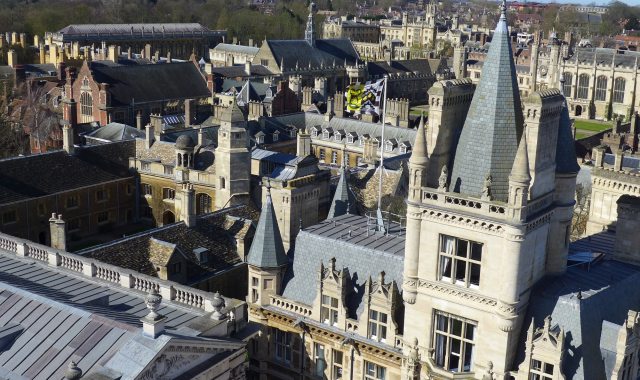Environment and sustainability at Caius
At Gonville & Caius College we are working as a community to respond to the climate emergency and contribute to the University of Cambridge’s net zero target by 2048, or sooner.
Below we outline some of our environmental policies and practices, and some of the ways in which the Caius community is engaged to make sustainability a straightforward, everyday occurrence.
Day-to-day operations and environmental behaviours
Caius achieved a Platinum Colleges award for the 2021-22 and 2022-23 Green Impact years, having been awarded Gold in 2020-21. Green Impact is the University of Cambridge’s environmental accreditation scheme, an initiative in place to help us all in departments and colleges across the University be more environmentally friendly through everyday actions.
The College’s Environmental Sub-Committee meets termly focusing on all environmental and sustainability issues, putting into practice matters relating to the Environmental Policy. Additionally, the environment is a standing item on all College committees.
The College’s Environmental Policy focuses on six prime areas of concern:
- the reduction, reuse and recycling of waste
- the reduction of fossil fuel consumption
- minimising the consumption of water
- sustainable transport
- the control of use of chemical pollutants; and finally
- the purchase of environmentally sound products
Those interested in more detail can read the full Environmental Policy.
The College has Green Officers in the GCSU and MCR, the elected student committees for undergraduates and postgraduates, respectively. A “Green Fellow” chairs the Environmental Sub-Committee. Currently this is Dr Ed Tanner, whose research is in botany and who also chairs the College’s Gardens Sub-Committee, aligning interests effectively between the two.
Caius uses regular communications with students, staff and Fellows via The Venn (the intranet), posters in residential and communal spaces, and regular dialogue through student representatives to highlight operational environmental and sustainability matters.
Strategic and estate level approaches
The College has been tackling energy consumption and CO2 emissions on major projects, but also in smaller ways.
Catering
The kitchen refurbishment in 2019/20 substantially de-gasified that operation and included discretionary expenditure on heat recovery technology which is performing better than expected, generating up to 220 KWh of heat energy versus the 120 KWh anticipated. The surplus will be harnessed to take out further gas-fired heating. As an corollary, the Caius system of a minimum dining requirement brings over 400 members to dine in College daily. As well as the social benefits of seeing friends daily, using the shared catering provision is far more heat efficient and results in lower food waste than 400 separately prepared meals. Across nearly 200 student kitchens or gyps over 70% are fitted with energy efficient induction hobs.
Residential
A major building refurbishment in 2023/24 is planned to introduce heat-pump technology and thermal performance improvement measures to reduce energy use; some of these (reversible secondary glazing suitable for use in a Grade II listed building) have already been implemented. Linked to the Green Impact Awards, regular campaigns are run to encourage students to turn down the heating dial and pull on a jumper – but such habits can be difficult to form, as evidenced on weekly rounds of College rooms, where open windows often overlap with radiators blasting heat. The same project will move to motion detection based heating and lighting (with overnight overrides!), and introduce radiant panel heating to bathrooms as a test case for its wider use across the Estate after successful pilots in several office rooms. Low energy LED lighting has been the default since 2015 and is now estimated to cover over 80% of the Estate.
Energy use reduction
The College is taking this experience further in investigating how it can plan strategically for the wider estate with a view to identifying the appropriate choice and phasing of projects to reduce energy consumption, particularly in relation to heating which is responsible for the college’s major Scope 1 emissions. Assessing the Estate zone by zone against the Science Based Targets data supported by the wider University, and considering all current – and evolving – heat pump and solar technologies has resulted in identification of two potential sites for ground source heat pump systems, and many more for air source equivalents. Importantly, the first step is to invest systematically in reducing heat loss from the building through improvements in glazing and insulation. Along with the majority of the Cambridge Colleges we continue to seek increasing flexibility from those tasked with the conservation of our older buildings, to permit these new technologies to be used.
Transport
Another Scope 1 concern. The College purchased its first electric van early in 2022 after installing EV charging on its West Road site for the use of staff, Fellows, guests and students in 2021. Cycling and walking are essential for all Caius students and Fellows as the Old Courts sits within a traffic free zone of Cambridge. The College has long targeted provision of one cycle space per student at every residence, but as property prices in the city rise, staff and Fellows find themselves travelling further and further to work. Supporting the move to e-bikes with appropriate secure storage is our next challenge; alongside advocacy for the city’s wider public transportation plans.
We note that the College purchases electricity using renewables contracts including electricity generated by two local solar farms. We recognise that this in no way replaces the need to reduce energy consumption but we note that participation in the contracts stimulates the provision of renewable energy to the grid.
The College’s investment policy is published elsewhere on the website.
Student-led sustainability practices
Caius students take part in and lead community campaigns in sustainability.
The GCSU Green Co-opt established the Gonville & Caius Sharing Forum in December 2021, which began in Lent Term 2022. Students can share non-perishable items and, due to living in close proximity, perishable items, advertised on social media and shared in a central location. This can include clothing and equipment, and students can make requests for items. As well as reducing waste, in sharing items free-cycling can enhance community mindedness.
Students are also able to opt-out of receiving junk mail in the College pigeonholes, with the unwanted mail sent for recycling instead.
Gonville & Caius Allotment Society was founded by Moby Wells (History 2019) and (former) Fellow Dr Lisa Kattenberg in Michaelmas Term 2021, with the support of Head Gardener Phil Brett.
Collaboration is central to the project and, in time, produce from the allotment can be provided to the Caius kitchens and served to the College community.
Collegiate Cambridge
The Cambridge Colleges Environmental Sustainability Report is published on the University website. Caius features on page 12, pictured below. Colleges and the University are in regular dialogue on all environmental and sustainability issues.
For any queries regarding environment and sustainability at Gonville & Caius College, please contact the Domestic Bursar’s office by emailing domestic.bursars.secretary@cai.cam.ac.uk



